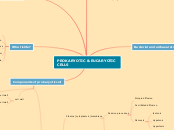PROKARYOTIC & EUCARYOTIC CELLS
Eukaryotic
membrane bound nucleus and nucleolus
complex appendages
linear DNA with histones
membrane bound organelles
membrane receptors
mitosis
cell wall simple when present
cytoskeleton
big ribosomes
Bacterial and archaeal structures
plasma membrane
selectively permeable barrier
gas vacuole
buoyancy for floating
ribosomes
protein synthesis
inclusions
storage of carbons, phosphates and others
nucleiod
localisation of genetic material
periplasmic space
G(-) contain hydrolytic enzymes
G(+) small or absent
cell wall
provides shape and protection
capsules and slime layers
resistance to phagocytosis
fimbriae and pili
attachment to surface
flagella
swimming motality
endospore
survival under harsh condition
Prokaryotic
unbound nucleoid
no cytoskeleton
simple appendages
small ribosomes
complex cell wall
circular DNA
no membrane bound organelles
binary fission
no membrane receptors
What is life?
Growth
Reproduction
Responsiveness
Metabolism
Cellular structure
Components of prokaryotic cell
structures external to the cell wall
Glycocalyx
Flagella
Monotrichous
Peritrichous
Amphitrichous
Lophotrichous
Axial filaments
Fimbriae and pili
cell wall
Gram positive cell wall
Gram negative cell wall
structures internal to the cell wall
Plasma (cytoplasmic) membrane
Passive processes
Simple diffusion
Facilitated diffusion
Osmosis
Isotonic
Hypotonic
Hypertonic
Active processes
Cytoplasm
Nuclear Area
Ribosomes
Inclusions
Metachromatic granules
Polysaccharide granules
Lipid inclusions
Sulfur granules
Carboxysomes
Gas vacuoles
Magnetosomes
